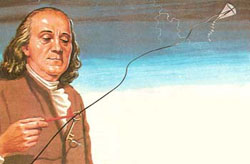History Of Benjamin Franklin
|
| updated |
Copy Link Code
|
 Before he was a Founding Father, Benjamin Franklin had already made great contributions to American culture, society and scientific understanding. The history of Benjamin Franklin includes his long list of inventions, discoveries and satirical publications that made him one of the most recognizable figures in all of colonial America. Titles for Franklin could be printer, publisher, scientist, satirist, postmaster, inventor, politician, diplomat and signee of the Declaration of Independence. His kite experiment, which proved that lightning was indeed electric, made him famous around the world and earned him an invitation to meet the King of France. In his periodic publication titled "Poor Richard's Almanack," Franklin left a legacy of aphorisms and sayings that have survived into the modern American lexicon. Today, Franklin is one of only two non-presidents to appear on American dollar bills and has also appeared on more postage stamps than any other American. Information on Ben Franklin has been related to us not only through his autobiography but also through a great number of accounts from his contemporaries.
Before he was a Founding Father, Benjamin Franklin had already made great contributions to American culture, society and scientific understanding. The history of Benjamin Franklin includes his long list of inventions, discoveries and satirical publications that made him one of the most recognizable figures in all of colonial America. Titles for Franklin could be printer, publisher, scientist, satirist, postmaster, inventor, politician, diplomat and signee of the Declaration of Independence. His kite experiment, which proved that lightning was indeed electric, made him famous around the world and earned him an invitation to meet the King of France. In his periodic publication titled "Poor Richard's Almanack," Franklin left a legacy of aphorisms and sayings that have survived into the modern American lexicon. Today, Franklin is one of only two non-presidents to appear on American dollar bills and has also appeared on more postage stamps than any other American. Information on Ben Franklin has been related to us not only through his autobiography but also through a great number of accounts from his contemporaries.
Born in Boston in 1706, Benjamin was the youngest son of Josiah Franklin and Abiah Folger. Josiah had nine other sons and Benjamin would not have much to expect in terms of inheritance; whatever he expected to accomplish in life would be on his own ambition. Benjamin was an apprentice at his brother James' print shop until he got in trouble for sending anonymous letters into their newspaper, The New England Courant, which brought great attention but also controversy. Benjamin ran away to Philadelphia and began work in another print shop. In 1724, the Governor of Pennsylvania sent him on a mission to purchase printing equipment in London but never sent the papers of credit required; Franklin was stranded there for two years until a wealthy merchant loaned him the money needed to return. Soon after working off his debts, Franklin assumed co-ownership of a print shop and a newspaper called The Pennsylvania Gazette. In 1730, Franklin acknowledged his illegitimate son William and took up a common law marriage with Deborah Read. Within just a few years, he became Grand Master of the local Masonic Lodge and helped open the first subscription library in the world.
Franklin's success in public life landed him a gig as the Postmaster of Philadelphia and eventually as the Deputy Postmaster-General of North America under colonial rule. His invention of the odometer helped him establish the fastest routes possible and bring renewed efficiency to the delivery service. During this time, Franklin also spent years traveling in France and Britain, including a trip to Ireland in which he witnessed the horrors of British oppression. Franklin was becoming more embroiled in the movement for American independence when a scandal stripped of his postal office. Franklin had leaked information from letters written by the Governor of Massachusetts to the British government asking for more troops to suppress the rebels. Info about Benjamin Franklin's role in the scandal made him an enemy in Britain. The year was 1774 and it was only two years later that Franklin would be advising Thomas Jefferson on the drafting of the Declaration of Independence. In the years before his death, Franklin would serve as the first Secretary of the U.S. Post Office and Governor of Pennsylvania. He wrote a magnificent autobiography with a list of 13 virtues by which he hoped his descendants and future Americans would live. For Ben Franklin, history has been kind and made him a universal hero in the American pantheon.
